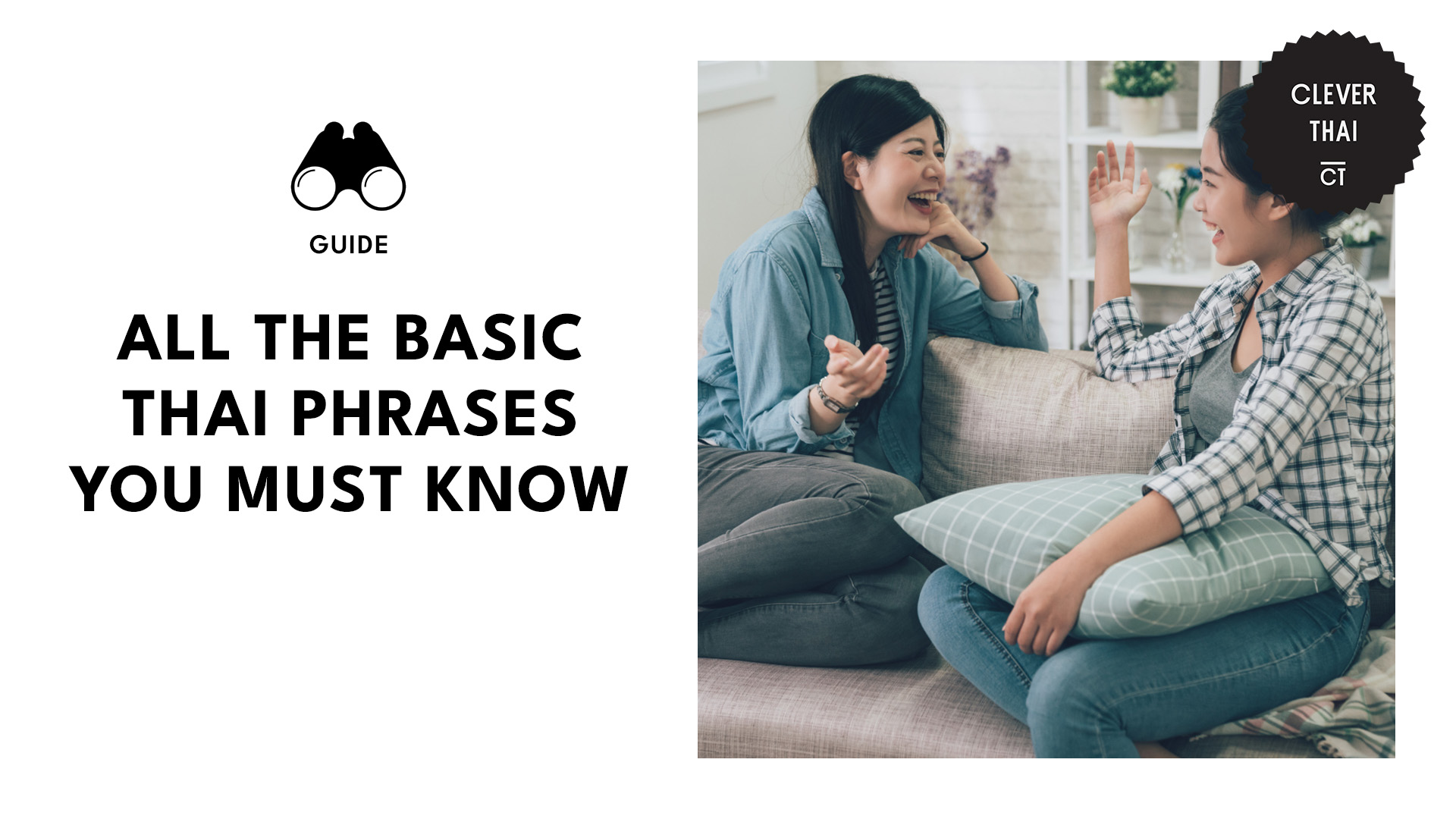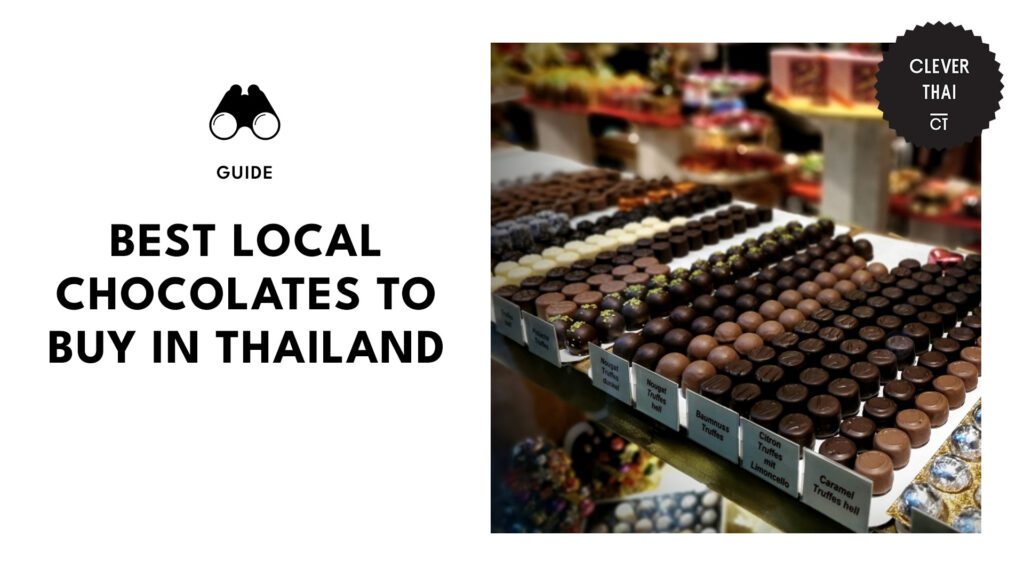Categories > Guides and Tips

All the Basic Thai Phrases You Must Know
- Basic Thai Phrases
- Khrup and Ka
- Chai and Mai Chai
- Kawp Koon
- Khaw toot khrup/ka
- Mai khao jai
- Mai pen rai
- Basic Thai Greetings
- Sawatdee khrup/ka
- Sawatdee tohn chao/bai/yen
- Sa bai dee mai khrup/ka
- La gorn khrup/ka
- Basic Thai Used at a Restaurant
- Mai phet/phet nit nawai/phet mak
- Mai sai nam tam
- Nam
- Roon/yen
- Aroy
- Basic Thai for Shopping
- Ra ka tao rai khrup/ka?
- Paeng mak khrup/ka
- Ga ru na lot ra ka hai noi khrup/ka?
- Basic Thai during a Night Out
- Ja deum arai mai?
- Khun naa rak, suay mak, lo mak
- Chan sod
- Chan mow
They say that when traveling, one of the best ways to connect with your surroundings is to learn the language. Learning even just a little bit of the local tongue can make your journey that much more meaningful, not to mention easier!
Taking on Thai might be intimidating for people without much experience with it, but you don’t need to worry. We’ve compiled some great phrases for everyday use during your journey in Thailand, so read on!
Basic Thai Phrases
| English | Thai |
| Yes | Chai |
| No | Mai chai |
| Thank you | Kawp koon |
| Excuse me | Khao toot khrup/ka |
| I don’t understand | Mai khao jai |
| No problem | Mai pen rai |
Khrup and Ka
While these words have no direct translation to English, they’re an important part of Thai language and culture. In Thai, there’s quite a bit of emphasis on keeping one’s tone polite and respectful.
This is where khrup and ka come in. If you’re male, end sentences and phrases with khrup/krap. On the other hand, ladies end with ka//kap. It helps to think of it as similar to other Asian languages that have their own form of honorifics when speaking!
Chai and Mai Chai
When asked simple yes or no questions, feel free to throw these in. The important thing to remember is that Yes is Chai, while no is Mai Chai. Don’t mix them up!
Kawp Koon
Make it a habit to use this often! To the drivers that take you around town, the hotel staff that make your stay comfy, the tour guides that share their expertise, the random passersby that offer you help… you really can’t say thank you, or kawp koon enough!
Khaw toot khrup/ka
This phrase is multipurpose, so it’s good to have this in your back pocket. Khaw toot khrup/ka can mean pardon me, excuse me, or sorry in English. Just like its English counterpart, this phrase has different uses in different contexts.
When wading through a crowded place (maybe during happy hour in Khao San? say this phrase to let people know you’re coming through. When asking for help from a local, you can also use this phrase to get their attention. Pretty handy, right?
Mai khao jai
No shame in being humble enough that you’re out of your depth with Thai. Mai khao jai means “I don’t understand,” and from there you can ask them to repeat what they just said in words you can understand better.
Mai pen rai
No worries! That’s the rough English translation of this famous Thai phrase. Whenever trouble comes your way, do as the Thai do and brush it off to face it head on. Mai pen rai!
Basic Thai Greetings
| English | Thai |
| Hello | Sawatdee khrup/ka |
| Good Morning | sawatdee tohn chao |
| Good Afternoon | sawatdee tohn bai |
| Good Evening | sawatdee tohn yen |
| How are you? | Sa bai dee mai khrup/ka? |
| Goodbye! | La gorn khrup/ka |
Sawatdee khrup/ka
This is your staple “hello!” when traveling in Thailand. Be sure to say this with a smile – you’re in the Land of Smiles, after all! If you want a more snappy alternative, young people like to use the shortened form watdee, the equivalent of “hi!”
Sawatdee tohn chao/bai/yen
While you can use sawatdee for any time of the day, sawatdee tohn chao/bai/yen are specific greetings for good morning, good afternoon, and good evening, respectively. Not used as commonly as just sawatdee, but good to know either way.
Sa bai dee mai khrup/ka
Throw this in tandem with your sawatdee, and you’ve got something like “hello, how are you?” in Thai. The locals will appreciate the effort you make to try to connect with them, for sure.
La gorn khrup/ka
And when it’s time to call it a day, la gorn khrup/ka is a great way to bid farewell to your Thai companions. Like always, a big smile to go along with it will let them know you’ve appreciated their time and hospitality.
Basic Thai Used at a Restaurant
| English | Thai |
| Not spicy | Mai phet |
| A little spicy | Phet nit nawai |
| Really spicy | Phet mak |
| No sugar | Mai sai nam tam |
| Water | Nam |
| Hot | Roon |
| Cold | Yen |
| Delicious! | Aroy! |
Mai phet/phet nit nawai/phet mak
Spice is a huge component of Thai flavor! Of course, not all of us can handle the heat as well as the Thai can, so restaurants are more than happy to adjust the recipe to your taste. If you want no spice, just a little, or all of it, keep the right phrase in mind.
Mai sai nam tam
On the topic of popular ingredients in Thai cuisine, sugar is up there as well! So if you’re watching your calories but just can’t resist some delectable delicacies, keep this phrase in handy!
Nam
Stay hydrated! Whether you’re out in the great outdoors or dining in a nice restaurant, remember this word for whenever you need water.
Roon/yen
Hot or cold? You’ll probably be asked that when being served water or coffee. Roon for hot and yen for cold – easy!
Aroy
Just had something particularly yummy? Serve your compliments to the chef with this easy word in Thai. The sentiment is all the more sincere when you use the local language to express appreciation.
Basic Thai for Shopping
| English | Thai |
| How much does this cost? | Ra ka tao rai khrup/ka? |
| That’s expensive | Paeng mak khrup/ka |
| Can you give me a discount please? | Ga ru na lot ra ka hai noi khrup/ka? |
Ra ka tao rai khrup/ka?
Bargaining at the night market is a bit of an art, and a lot of our friends say that asking how much something is is the first step to mastering it. Who knows, maybe asking in Thai might start you off on the right foot!
Paeng mak khrup/ka
Oof – that’s a bit steep, isn’t it? Wherever you travel, there’ll be bad eggs out there waiting to spring a fast one on you. If you feel like you’re getting scammed, or just want to say that it’s a bit more than you thought it would be, let them know with this phrase.
Ga ru na lot ra ka hai noi khrup/ka?
A little sweet talking can get you a long way at the night market. Why not do it in Thai for good measure? Try this out when picking up some souvenirs to see if you can get a discount if, say, you’re buying a few at a time or something.
Basic Thai during a Night Out
| English | Thai |
| Would you like a drink? | Ja deum arai mai? |
| You’re cute | Khun naa rak |
| Very beautiful | Suay mak |
| Very handsome | Lo mak |
| I’m single | Chan sod |
| I’m drunk | Chan mow |
Ja deum arai mai?
Asking someone if you can buy them a drink never gets out of style. Make friends with this phrase at the club or bar and let the good times roll!
Khun naa rak, suay mak, lo mak
Someone caught your eye? You know what they say – you miss 100% of the shots you don’t take! Let them know what you think with these phrases and see where things go from there.
Chan sod
Just to confirm that you’re single and ready to mingle, you can throw in this phrase so your intentions come across crystal clear.
Chan mow
Ready to call it in for the night? This phrase can let your newfound friends know you’re good for this adventure in Thai nightlife.





